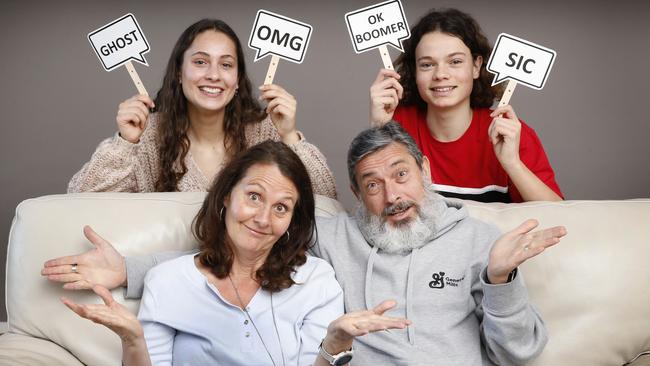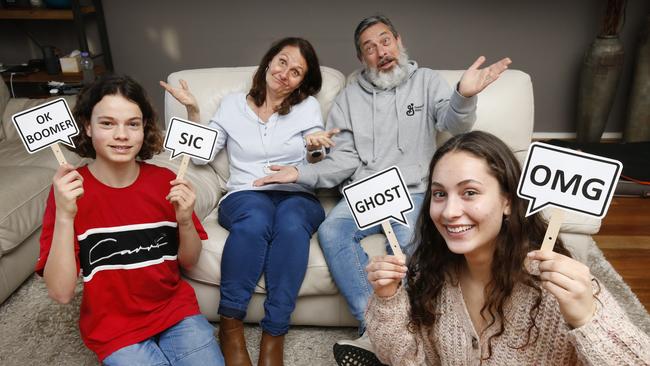Mind your language: understanding teen lingo
Social media is changing the way our kids speak to each other and to us. Experts say it can pay for parents to understand new teen lingo but just don’t try to use it. OK boomer!

From YouTube to TikTok, Instagram to Snapchat, social media is changing the way our kids speak to each other and to us.
New slang, new sayings and new accents are emerging in Australian households as the digital age breaks down old geographical language barriers.
Experts say while teens have long been the drivers of change in language, the shift is in overdrive thanks to social media. And while it can pay for parents to understand new teen lingo, they should think twice about trying to adopt it. OK boomer!
“Social media doesn’t really care about borders and boundaries, so it’s very, very easy for what’s happening on one side of the world to end up on the other side of the world,” says parenting expert Dr Justin Coulson.
“Teenagers see something really funny on YouTube and they incorporate it into their own language, they make it theirs. Then all of a sudden this thing that happened on TikTok or on YouTube becomes part of the language.”
University of Sydney professor of linguistics and head of the Sydney Centre for Language Research Nick Enfield says studies show teenagers have been leading changes in our language for many decades.
But rather than just being influenced by television, movies, radio and books, teens are now exposed to an endless social media feed from all corners of the globe. “The reach and intensity of the flow of information and new words and ideas has radically increased,” Enfield says.
Coulson says chatty teenage girls in particular play a big part in the evolution of language, while Enfield says teens are also more willing than older people to adopt new language.

Parents Coralie Higgins and Steve Camerotto say social media has a big influence on the language used by their kids, Luke, 15, and Ella, 16.
“Especially Luke, he speaks with a slight American accent all the time, it’s kind of a drawl that’s come from all the videos he watches,” Coralie says. She is keen to learn the lingo so she can follow conversations between her teens, whose latest favourites include “OK, boomer” (a put down of older generations), “sic” (really good), “OMG” (oh my god) and “ghost” (cutting contact).
Although not overly concerned about slang, Coralie does worry that teenagers might not always understand when it is appropriate to use it. “You don’t want them going into a job interview and using it, for example. You need to make sure they know when it’s the right audience.”
Coulson says parents should not be alarmed by changes to language.
“Some people will see it as bad because English is being massacred by young people today, they can’t spell, they can’t speak properly, all that sort of thing,” he says. “But language evolves, it always has and it always will. And it is the job of young people to drive that evolution.”
Enfield says teens use slang to set themselves apart, and much of it is creative. “It denotes a kind of ‘in group’ membership. It is intended not to be used by everyone in the population. If parents start using slang then that slang will disappear, the kids will stop using it exactly because their parents are using it.”
Coulson, who has six daughters, says there is nothing wrong with parents wanting to understand teen slang but cautions against using it themselves. “If parents really want to incorporate teen slang into their own conversations, go for it, but just be mindful that your kids are going to look at you weird and think that you’re trying too hard.”
He says understanding teen slang is no substitute for having a good relationship with your child.
“If you have a high quality connection with your child where they feel like they can talk to you, you don’t need to know their slang.”
A GUIDE TO THE LATEST TEEN SLANG
Boomer: Someone old, out of touch, resistant to change
Bruh: Bro or an expression of exasperation
Cap: A lie
Dope: Cool or awesome
Extra: Over the top (positive/negative)
Finna: Instead of saying “going to”
Fire: Great, amazing, wonderful
Flex: Show off
Gucci: Good
Have beef: Problem or conflict
Karen: Entitled, irritating, complaining woman who often requests to talk to the manager
Lit: Amazing or cool
Lowkey: Play down something exciting
No cap: Not lying, for real
OG: Original
Salty: Annoyed, upset, bitter
Shade: Sneaky actions or to throw a critical remark at someone
Ship: When someone thinks two people make a good couple
Sip tea: Minding your own business
Spilling tea: Gossip you’ll share
Sweat: Someone who tries too hard
TBH: To be honest
Thicc: Positive way to describe someone with big bottom and thighs
Thirsty: Overly eager or desperate
When: As if to say “when did I ask you to talk to me or ask me a question?”
Yeet: Exclamation of excitement
Originally published as Mind your language: understanding teen lingo
